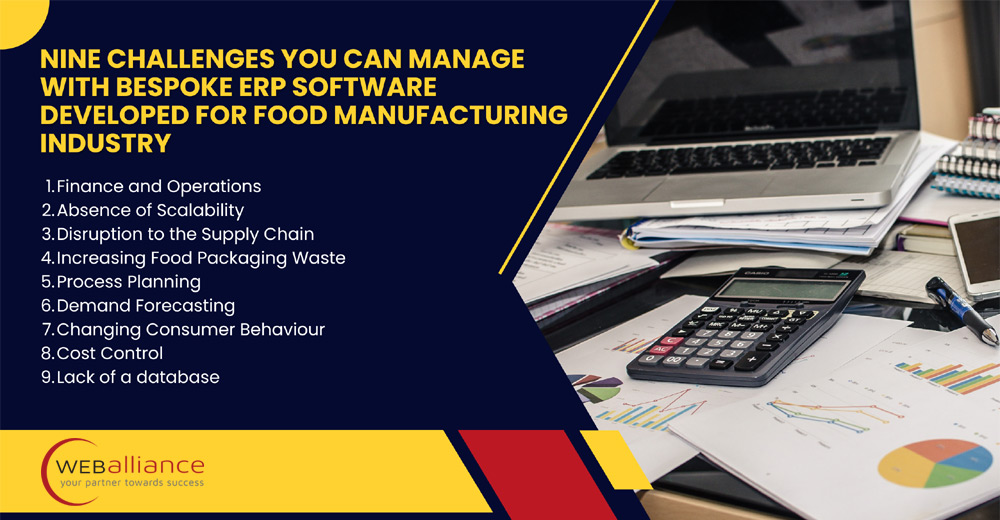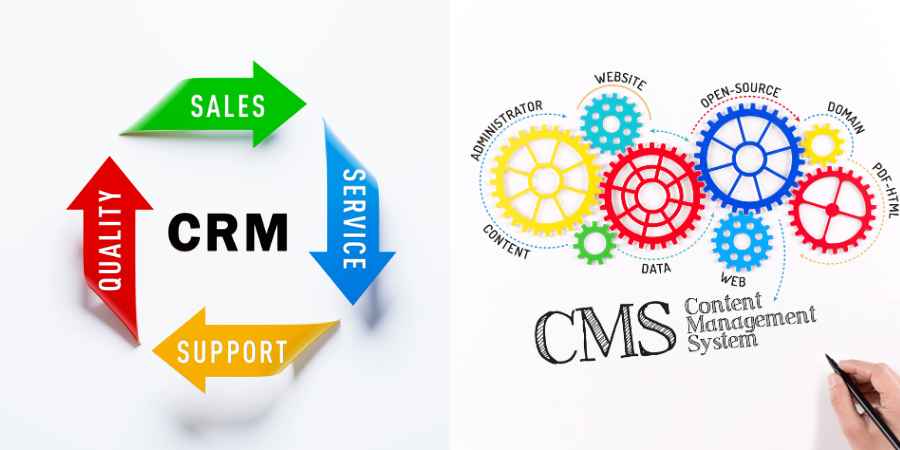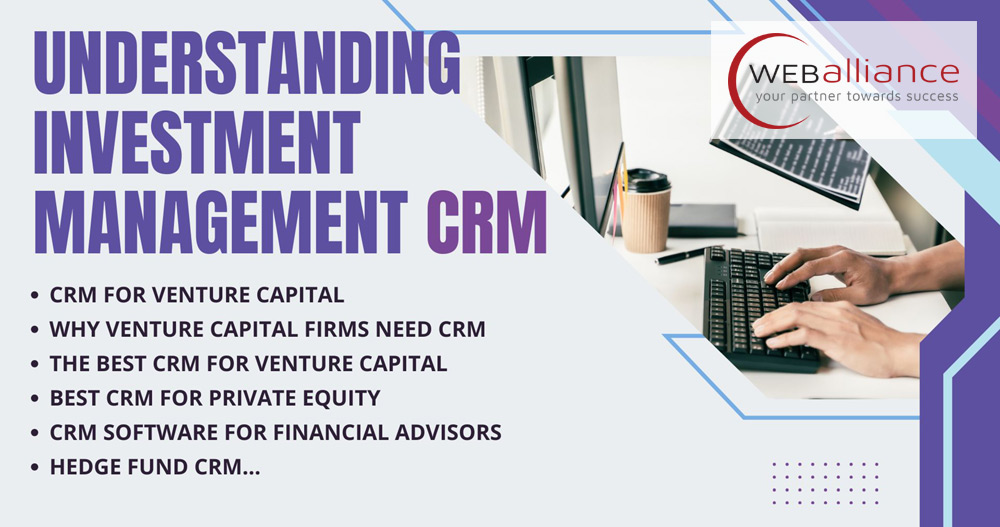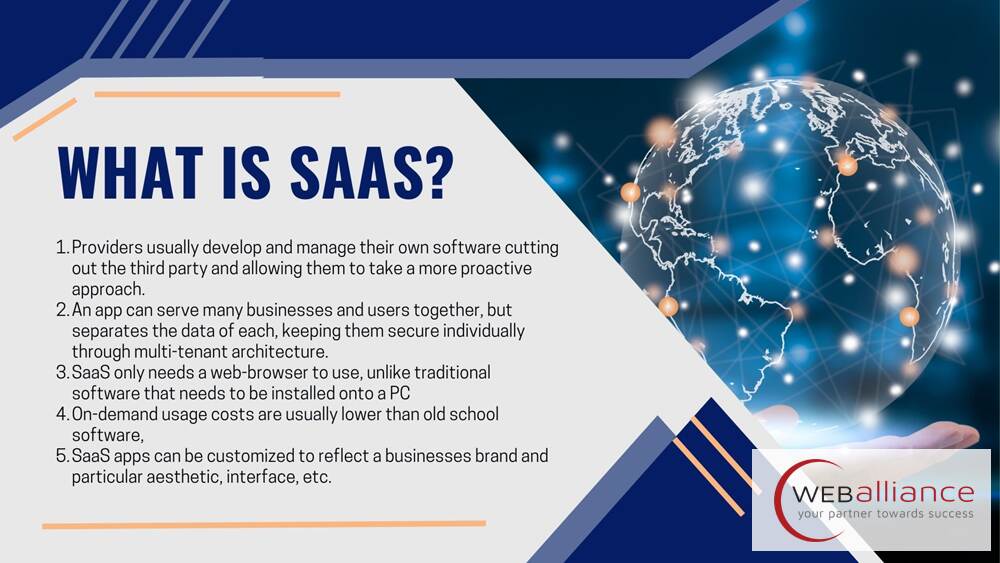How Food Manufacturing ERP Software Can Revolutionise Your Operations

Unlock the full potential of your food manufacturing business with custom ERP solution developed by Web Alliance, the leading bespoke software development company based in Northampton, Northamptonshire, UK. Changing consumer buying habits and successive economic shocks have created a storm of insolvencies within the food and beverage industry leading to a 102% rising in insolvencies from 2022 to 2023. The bespoke food ERP software optimizes your operations, from recipe development to dispatching your products faster for efficient marketing. If you still don’t have a customized ERP solution, you might be broadening competency gaps. Bespoke ERP software empowers food manufacturing businesses stay ahead of competitors by maximizing efficiencies in all the verticals while ensuring compliance with UK industry standards.
Nine Challenges You Can Manage with Bespoke ERP Software Developed for Food Manufacturing Industry
How beneficial is a custom ERP software solution for food manufacturing industries in the UK? A tailored-to-need ERP system for food manufacturing businesses empowers them to manage and improve most the important operations like human relations, purchase, finance, production, accounts, etc. Do you need to invest in bespoke ERP system integration? How will an ERP help you achieve your growth goals while combating challenges? Here, I list common nine challenges that food manufacturing businesses can manage effectively by bespoke ERP software integration-
- Finance and Operations: Due to low profit margins and increasing raw material expenses, food producers in the UK are struggling to sustain operations. To manage finance and operations with improved efficiency, you need to optimize business processes with a bespoke ERP solution especially designed for food processing.
- Absence of Scalability: The majority of food manufacturing industries suffer because of not having a tech-based tool to scale the performance. Without having
- Disruption to the Supply Chain: The recent war in Ukraine is contributing to unprecedented difficulties within the food manufacturing supply chain.
- Increasing Food Packaging Waste: Food packaging waste is one of the most commonly experienced challenge.
- Process Planning: A product's successful transition from manufacturing to delivery is ensured by effective production planning. In the absence of a custom ERP system, it is a time-consuming task having high potential of committing mistakes.
- Demand Forecasting: In the absence of a custom ERP system, demand forecasting drives in uncertainties.
- Changing Consumer Behaviour: There is a significant shift in consumer behaviour driven by increased health and wellness awareness.
- Cost Control: Finding new ways for cost control without compromising with quality standards is a complex challenge without having data-driven insights.
- Lack of a database: The food manufacturing sectors lack the data-based insights to make informed decisions.
11 Benefits of Bespoke Food Manufacturing ERP Software: Complete Business Management Solution
A reliable and custom-to-need ERP for the food industry is a steppingstone for businesses aimed to accelerate financial growth in a complex and challenging environment. So, what are the benefits of custom food manufacturing ERP software?
- Improved traceability and control over the entire inventory
- Improved processes in food manufacturing cycle
- Increases production efficiency
- Reduced wastage of raw material that minimizes production costs
- Improved quality control throughout the manufacturing processes
- Improved end-to-end vendor/supplier management
- Reduced paperwork and human errors
- Availability of auto-generated real-time data the make informed decisions
- Fostered enterprise-wide visibility and smooth communication
- Optimized operational efficiency
- Maximized sales opportunities
The benefits of bespoke food manufacturing ERP software solution are not limited just to the above listed benefits; you will experience many more after ERP integration with existing system. Yes, the success depends upon selecting the best suitable ERP system having all the essential features that your food industry needs.
What are the essential features of ERP Software for Food Manufacturing Businesses
When you choose to have a custom ERP for food manufacturers, you have freedom to optimize features of your ERP software. The selection of ERP features for food manufacturing depends upon your particular workflow and existing system. However, the following list of must have features of food manufacturing ERP software will help you optimize required features, functionalities, and capabilities-
Management of Production: ERP systems designed for the food production sector incorporate sophisticated production management functionalities. These assist manufacturers in effectively organizing, overseeing, and managing production workflows. The system ensures the efficient use of raw materials, minimized waste besides helping in batch and recipe management, enabling manufacturers to match the changing demand while preserving product consistency.
Regulatory Conformity and Traceability: ERP's ability to ensure regulatory compliance is a crucial component of food production. ERP systems provide thorough traceability, enabling producers to keep an eye on ingredients as they travel from suppliers to final consumers. This degree of traceability helps ensure food safety, expedites recall processes, and conforms with strict regulatory rules such as those set forth by the FDA, USDA, or other international standards.
Management of Recipes: This feature must have the ability to change and swap out things as well as the ability to track ingredients, amounts, and costs. Food manufacturers may easily modify recipes as needed and preserve consistency in their goods by using recipe management.
Analyzing Data: Because data analysis makes it possible to examine data from various sources, such as sales, production, and inventory, data analytics becomes a powerful tool for food producers. Manufacturers can identify areas that require improvement, gain valuable insights into their operational processes, and make data-driven decisions by employing data analytics. To efficiently track and assess crucial KPIs, look for an ERP system that offers configurable dashboards and reports.
Administration of Suppliers: This feature enables food manufacturers to monitoring inventory levels, managing contracts and pricing, and tracking vendor performance. It facilitates food manufacturers build solid relationships with their suppliers and ensure a reliable supply chain by implementing vendor management.
Resource Allocation: It facilitates food manufacturing businesses for efficient use of resources such as labor, equipment, and raw materials. This feature helps to assign and plan activities, monitor the use of resources, and keep track of production costs. Food ERP program enable food manufacturers to improve their manufacturing techniques and reduce waste by allocating resources, which lowers costs and boosts productivity.
Management of Expenses: For food manufacturers, cost management is crucial. Food ERP allows them to track costs at each stage of production, evaluate cost variations, and set cost goals. AI-driven food ERP system enables manufacturers to identify different areas for cost reduction and make necessary adjustments to improve profitability by putting cost control into practice.
Process Optimization: Food ERP helps to improve and increase the efficiency of production processes. Process optimization is a crucial management task for food producers. Your ERP system should be capable to provide insights into process mapping, bottleneck identification, and change implementation to improve efficiency.
Order Processing: Custom-to-need food ERP makes it possible to handle customer orders and the fulfillment process. This feature should cover order tracking, inventory control, and the creation of shipping labels and invoicing. The real-time insights should support you ensure accurate and timely product delivery.
Production Scheduling: This must-have feature facilitates the development of production timelines. This capability must encompass planning for several production lines, monitoring production advancement, and implementing changes when necessary.
Scalable Capacity: Scalability is an essential feature of an ERP system for food producers. As your company expands, your ERP system must adapt to the rising demand and complexity.
Intuitive User Interface: An easy-to-use interface is crucial because it maximizes the use of ERP system to get maximum advantages. Interface should be in-line with the existing skill pool enabling intended users use it up to full potential with minimum training.
Pro-tip
One of best ERP software companies in the UK, Web Alliance has helped number of food manufacturing businesses in the UK to improve efficiencies, performance, production, workflow, and decision making that result in increased profitability. To book your free consulting session with food ERP experts, contact- https://www.web-alliance.co.uk/contact-form.
FAQs
Q. What is Food Manufacturing ERP Software?
Q. How can ERP software improve efficiency in food manufacturing?
Q. What role does ERP play in ensuring quality control and compliance?
Q. How does ERP software support inventory management in the food industry?
Q. Can ERP systems be customized for specific needs in food manufacturing?
Related Blogs

CRM vs CMS How are they different and how to integrate them
Having a fancy and responsive website is a must to have a …




